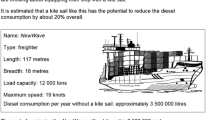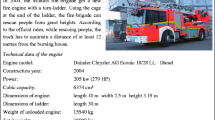Abstract
In this chapter, we report on multiple-choice tasks for assessing mathematizing competences of grade 9 students. The task format is complex, consisting of two layers. In the first layer, students are asked to consider a holistic modelling problem. In the second layer, they are asked for an atomistic competence (making assumptions, assigning variables, etc.) related to the same modelling problem. We conducted a qualitative study to investigate the validity of these tasks based on students’ response processes. Eight students worked in pairs solving the tasks collaboratively. The results show that all students were able to handle the layered task format. They reflected meta-cognitively on the holistic modelling problem, but none of them started solving it in itself. All students considered the remainder of the task, which made them focus on a specific mathematizing activity.
Similar content being viewed by others
References
Blomhøj, M., & Jensen, T. H. (2003). Developing mathematical modelling competence: Conceptual clarification and educational planning. Teaching Mathematics and Its Applications, 22(3), 123–139.
Blum, W., & Leiss, D. (2005). Filling up -the problem of independence-preserving teacher interventions in lessons with demanding modelling tasks. In M. Bosch (Ed.), Proceedings of CERME4 (pp. 1623–1633). Gerona: ERME.
Borromeo Ferri, R. (2006). Theoretical and empirical differentiations of phases in the modelling process. ZDM Mathematics Education, 38(2), 86–95.
Djepaxhija, B., Vos, P., & Fuglestad, A. B. (2015). Exploring grade 9 students’ assumption making when mathematizing. In K. Krainer & N. Vondrová (Eds.), Proceedings of CERME9 (pp. 848–854). Prague: Charles University of Prague, Faculty of Education and ERME.
Ericsson, K. A., & Simon, H. A. (Eds.). (1993). Protocol analysis: Verbal reports as data (revised ed.). Cambridge, MA: Bradford Books/MIT Press.
Frejd, P. (2013). Modes of modelling assessment – A literature review. Educational Studies in Mathematics, 84(3), 413–438.
Frejd, P., & Ärlebäck, J. B. (2011). First results from a study investigating Swedish upper secondary students’ mathematical modelling competencies. In G. Kaiser, W. Blum, R. Borromeo Ferri, & G. Stillman (Eds.), Trends in teaching and learning of mathematical modelling (ICTMA 14) (pp. 407–416). Dordrecht: Springer.
Haines, C., & Crouch, R. (2010). Remarks on a modelling cycle and interpreting behaviours. In R. A. Lesh, P. L. Galbraith, C. R. Haines, & A. Hurford (Eds.), Modelling students’ mathematical modelling competencies (ICTMA 13) (pp. 145–154). New York: Springer.
Haines, C., Crouch, R., & Davis, J. (2000). Mathematical modelling skills: A research instrument, Technical Report No. 55. Hatfield: University of Hertfordshire, Department of Mathematics.
Kaiser, G., & Brand, S. (2015). Modelling competencies: Past development and further perspectives. In G. A. Stillman, W. Blum, & M. S. Biembengut (Eds.), Mathematical modelling in education research and practice: Cultural, social and cognitive influences (pp. 129–149). Cham: Springer.
Krathwohl, D. R. (Ed.). (1998). Methods of educational and social science research: An integrated approach. New York: Longman.
Maaß, K. (2006). What are modelling competencies? ZDM Mathematics Education, 38(2), 113–142.
Niss, M., Blum, W., & Galbraith, P. L. (2007). Introduction. In W. Blum, P. L. Galbraith, H. Henn, & M. Niss (Eds.), Modelling and applications in mathematics education: The 14th ICMI study (pp. 3–32). New York: Springer.
OECD. (2014). PISA 2012 results: What students know and can do – student performance in mathematics, reading, and science. http://www.oecd.org/pisa/keyfindings/pisa-2012-resultsvolume-I.pdf. Accessed on 10 Sept 2015.
Pellegrino, J., Chudowsky, N., & Glaser, R. (Eds.). (2001). Knowing what students know: The science and design of educational assessment. Washington, DC: National Academy Press.
Reit, X. R., & Ludwig, M. (2015). An approach to theory based modelling tasks. In G. A. Stillman, W. Blum, & M. S. Biembengut (Eds.), Mathematical modelling in education research and practice: Cultural, social and cognitive influences (pp. 81–91). Cham: Springer.
Stacey, K., & Turner, R. (2015). PISA‘s reporting of mathematical processes. In K. Beswick, T. Muir, & J. Wells (Eds.), Proceedings of PME39 (Vol. 4, pp. 201–208). Hobart: PME.
Vos, P. (2007). Assessments of applied mathematics and modelling: Using a laboratory like environment. In W. Blum, P. L. Galbraith, H. Henn, & M. Niss (Eds.), Modelling and applications in mathematics education: The 14th ICMI study (pp. 441–448). New York: Springer.
Author information
Authors and Affiliations
Corresponding author
Editor information
Editors and Affiliations
Rights and permissions
Copyright information
© 2017 Springer International Publishing AG
About this chapter
Cite this chapter
Djepaxhija, B., Vos, P., Fuglestad, A.B. (2017). Assessing Mathematizing Competences Through Multiple-Choice Tasks: Using Students’ Response Processes to Investigate Task Validity. In: Stillman, G., Blum, W., Kaiser, G. (eds) Mathematical Modelling and Applications. International Perspectives on the Teaching and Learning of Mathematical Modelling. Springer, Cham. https://doi.org/10.1007/978-3-319-62968-1_50
Download citation
DOI: https://doi.org/10.1007/978-3-319-62968-1_50
Published:
Publisher Name: Springer, Cham
Print ISBN: 978-3-319-62967-4
Online ISBN: 978-3-319-62968-1
eBook Packages: EducationEducation (R0)




